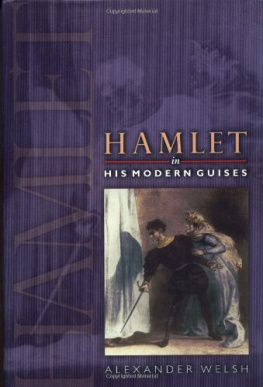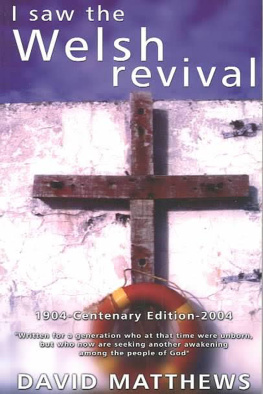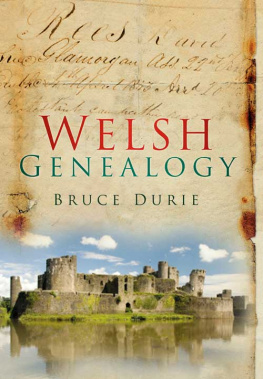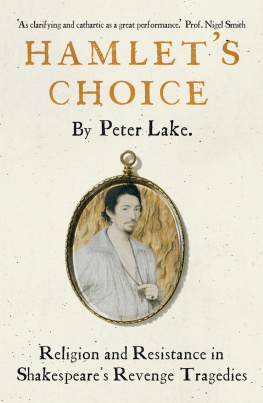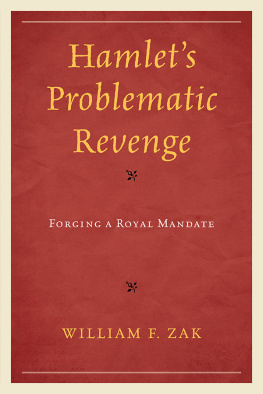Hamlet in His Modern Guises
ALEXANDER WELSH
PRINCETON UNIVERSITY PRESS
PRINCETON AND OXFORD
Copyright 2001 by Princeton University Press Published by Princeton University Press, 41 William Street, Princeton, New Jersey 08540 In the United Kingdom: Princeton University Press, 3 Market Place, Woodstock, Oxfordshire OX20 1SY All Rights Reserved
Library of Congress Cataloging-in-Publication Data
Welsh, Alexander. Hamlet in his modern guises / Alexander Welsh. p. cm. Includes index. ISBN 0-691-05093-7 (alk. paper) 1. Shakespeare, William, 15641616. Hamlet. 2. Shakespeare, William, 15641616Influence. 3. Fiction19th centuryHistory and criticism. 4. Fiction20th centuryHistory and criticism. 5. Moderism (Literature) 6. Heroes in literature. I. Title. PR2807.W39 2001 809.93351dc21 00-038563
This book has been composed in Janson
The paper used in this publication meets the minimum requirements of ANSI/NISO Z39.48-1992 (R1997) (Permanence of Paper)
www.pup.princeton.edu
Printed in the United States of America
1 3 5 7 9 10 8 6 4 2
Character, says Novalis, in one of his questionable aphorisms character is destiny. But not the whole of our destiny. Hamlet, Prince of Denmark, was speculative and irresolute, and we have a great tragedy in consequence. But if his father had lived to a good old age, and his uncle had died an early death, we can conceive Hamlet's having married Ophelia, and got through life with a reputation of sanity, notwithstanding many soliloquies, and some moody sarcasms towards the fair daughter of Polonius, to say nothing of the frankest incivility to his father-in-law.
(George Eliot)
Contents | Preface and Acknowledgments |
| Chapter One
Medieval Hamlet Gains a Family |
| Chapter Two
Hamlet's Mourning and Revenge Tragedy |
| Chapter Three
History, as between Goethe's Hamlet and Scott's |
| Chapter Four
Hamlet's Expectations, Pip's Great Guilt |
| Chapter Five
Hamlet Decides to Be a Modernist |
| |
|
|
Preface and Acknowledgments
HAMLET BECAME a modern hero, I contend, as soon as Shakespeare put his hands on him four hundred years ago. At least, the only other Hamlets who have come down to us are distinctly medieval, even ancient, if folk and classical analogues are taken into account. The leading difference between Hamlet and the earlier narrated adventures of the same hero is the introduction of a close-knit family. Indeed Shakespeare underlined the difference by creating two families, the second fashioned around the nameless friend of the hero's stepfather who would come to be called Polonius. With two families in hand, the playwright constructed his superb model of filial relationships, the resonance of which is attested by the fame of his play. By the later eighteenth century Hamlet became a stronger cultural force than in the days of its first performances, and its influence thereafter increased. To stay in the forefront of this growth industry, Hamlet had to be modern.
In a laboratory for the study of filial relations, if there were no troublesome rules about the use of human subjects, one would presumably kill off a few fathers and watch what happened. Fortunately, we have various verbal and miming techniques called plays, in which lethal injections (say into the ear) can be performed quite harmlessly and the reactions of sons directly imagined. Of course Shakespeare did not set out to study any human behavior in the abstract, but unquestionably the death of Hamlet's father puts the young man and their relationship, and the relationship with the mother and the girlfriend, to the test. About twenty years ago, after conducting an undergraduate seminar on Hamlet and during a painful time in my own life, I wrote an essay on Hamlet's task in mourning the loss of his father. The essay endorsed, in passing, the notion that Shakespeare adapted the story with the knowledge of his own father's death, or impending death, in 1601. I still find myself pondering what the play meant to its author. Shakespeare did not have to behave like Hamlet or even especially to feel like Hamlet in order to put his experience, and that of so many other sons and fathers, to good use in the theater. He did what he could do sympathetically for Hamlet. He needed no laboratory for his experiment. But the resulting play, in its accommodating texture, has provided ample work room for later writers great and small.
The present book is far from a survey of later writers' uses of Hamlet. For one thing, I do not even touch on the vast stage history of the play. I do discuss a group of sixteenth-century revenge tragedies in support of the
-ix-
argument that revengeespecially brooding about revengeis a function of mourning. These guides are the best we have to what Shakespeare thought he was doing with and for the audiences of his own time. When I turn to the period of Hamlet's ascendancy in Western culture, however, I treat of novels and become highly selective. In the nineteenth century the novel, rather than drama, was dominant in the literary marketplace and the genre of choice for studies of character. By selecting a few well-known novels, I can hope to show in some detail how Goethe, Scott, Dickens, Melville, and Joyce responded to Shakespeare's play. A major purpose of this book is to let such later writers help us see why Hamlet is a distinctly modern hero.
I hasten to add that each of the novels discussed here would have taken one shape or another had Hamlet never existed. These are works by strong writers with agendas of their own: the use they make of Hamlet is gratuitous, as it were, and thus affords all the more remarkable commentary on the possibilities inherent in the play. Goethe's Wilhelm Meisters Lehrjahre in effect delivers the hero from allegiance to the older generation, while at the same time it enlarges on the possibility that he could write for the theater as well as patronize it. By enlisting Hamlet for his autobiographical novel, Goethe accepts the idea that it is Shakespeare's signature work. He celebrates Hamlet's intellect and learning process by making his own work a bildungsroman. His novel has come to be seen as an important event in literary history, and it says something about perceptions of Hamlet that each of the novels I examine here is in some sort a bildungsroman and in some degree autobiographical.
Ayounger contemporary of Goethe's, Scott wrote many more influential novels, all in the last third of his lifetime. As he himself would admit, his heroes proper were much of a sameness; but their sameness follows from their representativeness. They stand for a new polity of the present and future generations; and the pastthe ancien rCgime, let's call itcan be mourned for as dead and over with. One novel, Redgauntlet, engages more than the others with Hamlet: it is recognized as one of Scott's autobiographical fictions and it owes something, almost certainly, to Goethe as well as Shakespeare. The hero of Dickens's Great Expectations is also representative (he could virtually be anonymous as well). Pip's outward story is that of a working-class lad from the provinces who manages to reach the city and get a hold on gentility, which he keeps hold of by eventually emigrating to the colonial world. His inward story is a dream of the same, at once more aggrandizingly pleasurable and nightmarish in its criminal

